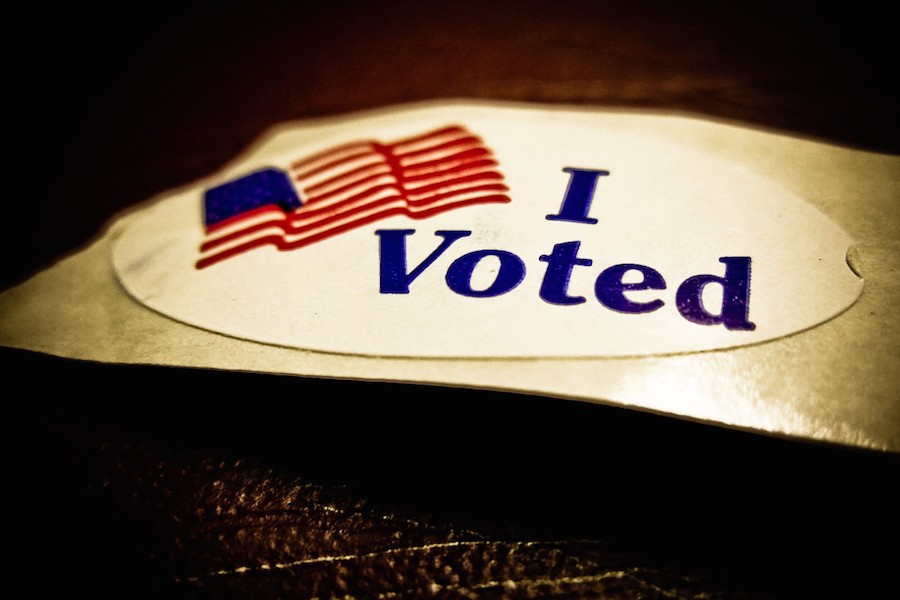An Idiot’s Guide to The 2016 Elections
March 1, 2016
As we undergo the presidential primary elections state-by-state, politics have saturated the mainstream media. Over the last few months, it has become commonplace to hear discussions of the upcoming presidential campaign anywhere and everywhere from televisions to classrooms.
With a nation divided on topics such immigration, gun control, healthcare, income inequality, and the push for social rights for women and minorities, each politician claims to have the solution; however, their plans often lack clarification.
For this reason, it is not be unusual for a young voter to be overwhelmed and confused over which candidate to support in the 2016 presidential election. Some young voters assume the political views of his or her parents, while others might blindly follow a well-respected or popular candidate without knowledge of how he or she plans to change the country.
Regardless of political stance, many agree on the importance of voter education, so before attending the Massachusetts Primary or voting in the final election tomorrow, here is a basic guide to each candidate’s platform for the 2016 presidential election:
Hillary Clinton
Women’s Rights– As a consistent supporter of feminist issues, Hillary Clinton supports wage equality. She traveled around the world speaking in different countries about equal access to education, protection against sexual abuse, and fighting against laws that restrict the type of work a woman could legally do. She is pro-choice, and wishes to continue funding Planned Parenthood.
Criminal Justice Reform– Supports banning or lowering mandatory minimum prison sentences for nonviolent drug offenses, along with the Fair Sentencing Act of 2010, which lowers the penalty for current non-violent petty criminals. She also claims to believe in focusing on rehabilitation as opposed to punishment for drug-offenses and as a way to move ex-cons back into society. Lastly, Hillary Clinton hopes to end the privatization of U.S prisons, and would be willing to move marijuana to a schedule II drug in order to legally facilitate further research and development of medical pot.
Infrastructure/Social Economics– Plans to boost the federal infrastructure bill by $275 billion over the next five years along with establishing a $25 billion federal bank providing loans and federal support for investments in energy, water, broadband transportation, and other multi-modal infrastructure investments. Clinton plans to expand medicare and social security by promising to fight attempts to repeal the Affordable Care Act, and supports light taxation of the wealthy to aid in financing social security.
Bernie Sanders
Income Inequality– Bernie Sanders has always been a consistent advocate for income and wealth equality since the start of his career. He hopes to end corruption in politics, along with the growing wealth gap across United States from lack of government regulation. Bernie Sanders hopes to drastically change the foundation of the U.S. economy in order to strengthen the middle class and let education flourish. He plans to make sure corporations are not exempt from taxation due to outsourcing by reversing trade deals such as NAFTA and CAFTA with China. Most famous, however, is his tax plan which involves high taxes on individuals making over $250,000 a year in order to fund social improvements such as free public college tuition nationwide, VA reparations, universal healthcare, and increased social security benefits. In terms of wage, Bernie Sanders supports lifting the federal minimum wage to fifteen dollars an hour. Additionally, he claims he would sign the Paycheck Fairness Act which makes it illegal to alter an individual’s wage because of his or her gender.
Infrastructure– Plans to invest $1 trillion in infrastructure projects in order to repair crumbling roads, bridges and transportation routes. This is intended to create jobs as well as improve the country internally.
Social Rights- Since the height of the Civil Rights movement in the 1960’s, Bernie Sanders has been a consistent advocate for Black rights by protesting and even was arrested for speaking up for equality and desegregation as a young man. Currently, he supports the demilitarization of local law enforcement agencies and taking assault weapons and armored vehicles out of local police stations. Along with this, he mentions supporting federal regulations on police departments including mandatory body cameras to provide an accurate account of police brutality incidents as well as more intensive training for law enforcement officers across the country. To Bernie Sanders, civil rights come hand-in-hand with prison reform and the federal legalization of marijuana. He considers mass incarceration for minor drug crimes as specifically targeting black communities.
Donald Trump
Immigration- One of Donald Trump’s boldest stances is on immigration. He favors a temporary block on Syrian refugees coming into the United States but is most famous for his opinion on Mexican immigration. Trump supports heavy militarization of the Southern border through the construction of a large wall which would be financed by Mexico. Along with this, he has strict views on deportation of illegal immigrants, and would like to hire more ICE officers in order to enforce his no tolerance illegal immigration policy.
Tax Reform– Wants to cut income taxes for singles earning less than $25,000 a year, or couples earning less than $50,000 a year. As a conservative, he has a unique plan to cut loopholes which allow large business owners to avoid paying taxes.
Firearms– Believes that the government has no business interfering with the type of firearm an individual would like to purchase, and is against regulations on magazines, or semi-automatic weapons. Donald Trump has admitted personally that he has a carrying permit and considers it his right to do so. As for background checks, he argues that the current system is not functioning as it should and suggests replacing background check regulations as opposed to expanding them.
China-U.S. Trade Policy– Trump considers our current trade deal with China to be destructive and a threat to American values. He does not believe that the United States should have to compete with the working conditions of China. Instead, he thinks that before the U.S. negotiates with China for overseas production, negotiations should be put in place to make sure that when trade deals with China are made, taxes are paid on either side.
Marco Rubio
Families/Marriage– Marco Rubio talks about family values often and incorporates this into his tax plan. He believes that creating a $2,500 per child tax credit would help working parents raise children. Rubio also supports paid leave for new parents without tax interference. Of his more conservative views, he is opposed to gay marriage, saying that marriage should be between a man and a woman.
Agriculture– Believes that farming regulations and taxes should be lowered or cut, including the carbon tax, controlling fossil fuels and the Punitive Death Tax. He also plans to cut federal regulation on the cleanliness of dams, springs, and other waterways. Marco Rubio supports loose enforcement of current endangered species or wildlife protection laws and regulations.
Firearms– Like many republicans, Marco Rubio believes in lax gun laws, and loose federal regulation of firearms across the country. Unlike Donald Trump; however, he refers specifically to reasonably-sized magazines and sporting rifles, as opposed to semi-automatic weapons. Rubio considers gun ownership a “god-given” right and thinks that permit licenses should be universally valid over state borders similar to driver’s licenses.
Ted Cruz
National Security– Ted Cruz is a hawk in the war against ISIL and believes the way to defend our country is through a more aggressive approach in Syria, putting boots on the ground, and placing a temporary block on Syrian immigration. He also plans to repeal the U.S.-Iran deal and hopes for the secretary of state to legally recognize the Muslim Brotherhood as a foreign terrorist organization. Cruz has also mentioned an increase in defense funding for the U.S armed forces.
Religion– He is focused on boldening the presence of Christianity in American culture and government. Ted Cruz fought to preserve the lines “One nation under God” in the pledge of allegiance. Along with this, Cruz supports the use of religious banners at public school events, and considers safe abortion an attack on his faith. Other than Christianity, he has scarcely mentioned the rights of any other religious groups.
Gay Rights- Opposed to same-sex marriage, calling it a “real danger to our liberty.” Ted Cruz also fought to reverse the Supreme Court decision to legalize gay marriage considering it an attack on states’ rights.
Ben Carson
Cyber Security– Ben Carson sees Cyber attacks from overseas a great threat to the nation’s security, and plans to develop protection against cyber terrorism, as well as developing intelligence on other countries to stop attacks ahead of time.
Conflict in Syria– Plans to push sanctions on Jihadist nations, in order to damage its economy internally. Additionally, he plans to block ISIL’s move into North Africa by fighting on the grounds of Libya. Ben Carson believes a formal declaration of war should be made, allowing the United States to increase its effort on the battlefront with ISIL.
Changes in Government– Considers government under the Obama Administration a bureaucracy, and plans to utilize taxpayer feedback on government services and agency policies, along with implementing forms of public reporting in an attempt to treat taxpayers as co-owners of the government. He also references cutting regulation and taxation on big businesses, in the belief that they strengthen the American population.
Gay Rights– Believes that being gay is a decision, and has compared gay marriage to beastiality. Ben carson has declined the legal ability of LGBT couples to adopt children, and has showed belief in/support for “conversion therapy” counseling to try change the sexulaity of LGBT individuals.
John Kasich
Education– John Kasich is a strong opponent to federal involvement in curriculum or any aspect of the school system. He believes in keeping the federal government out of public schools, leaving them state and district regulated. Kasich believes that parents should play a part in the education of their child, and should cooperate with the school district in order to ensure that their personal expectations and standards are met.
Defense– Is motivated to defeat ISIL by working together with European allies and strengthening cyber defense. Along with this, Kasich hopes to support the Ukraine on the frontlines of Russia, and aid in Japan’s naval defense.
Abortion/Childcare– Kasich fought the taxpayer funding of Planned Parenthood, stating that he would prefer encouraging adoption. Although against abortion, John Kasich helped to produce a state funding system for rape crisis centers, and helped to create a pregnancy support program, providing counseling, along with cribs, blankets, and formula to new mothers.
Health Care– Opposes Obamacare and plans to replace it with a more individual-focused plan to keep patients healthy as opposed to covering their medical expenses while ill or injured. He claims this will make health care more affordable and efficient, but details are blurry as to the details of his plan specifically.







